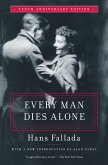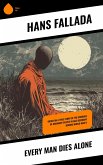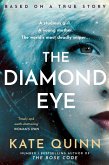Hans Fallada's "Every Man Dies Alone" is a poignant exploration of individual resistance in the face of immense totalitarian oppression, set against the backdrop of Nazi Germany. Through a compelling narrative style that combines stark realism and psychological depth, Fallada chronicles the story of Otto and Elise Hampel, a couple who undertake a quiet yet courageous act of defiance by distributing anti-Nazi postcards. The novel's fragmented structure and nuanced character development reflect the psychological turmoil of ordinary people trapped in extraordinary circumstances, aligning with the broader literary movements of the early 20th century, particularly the German expressionist desire to portray raw human emotions amid societal chaos. Hans Fallada, born Rudolf Wilhelm Friedrich Ditzen, experienced firsthand the anxieties of Weimar Germany and the subsequent rise of the Third Reich. His troubled life, marked by personal struggles with addiction and political disillusionment, deeply influenced his writings. Fallada's unique perspective as a socially conscious writer enabled him to illustrate the moral complexities faced by individuals when confronting authoritarianism, as he sought to capture the essence of humanity amid despair. "Every Man Dies Alone" is not merely a historical account but a timeless reflection on the courage it takes to assert one's beliefs in dire circumstances. This novel is a must-read for anyone interested in the human capacity for resilience and the moral dilemmas encountered in repressive regimes. Fallada's masterful prose will engage, educate, and provoke thoughtful discussion, making it an essential addition to the canon of anti-fascist literature. This translation has been assisted by artificial intelligence.
Dieser Download kann aus rechtlichen Gründen nur mit Rechnungsadresse in A, B, BG, CY, CZ, D, DK, EW, E, FIN, F, GR, H, IRL, I, LT, L, LR, M, NL, PL, P, R, S, SLO, SK ausgeliefert werden.









